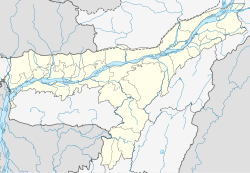North Kamrup violence
Series of violent activities in Assam, 1980 From Wikipedia, the free encyclopedia
The North Kamrup violence was a series of violent incidents in North Kamrup, Assam, on 4–5 January 1980 between those who supported the Assam Movement and those who opposed it.[1][2][3] Triggered by the death of a high school student, a member of the AASU, it led to a series of attacks and counter-attacks between Assamese and immigrant villages leading to a curfew.[4]
| North Kamrup violence | |
|---|---|
| Location | North Kamrup, Assam, India |
| Date | 3 January 1980 (UTC+5:30) |
| Target | pro- and anti- Assam Movement |
Attack type | Group clash |
| Weapons | Guns, spears, swords, and scythes. |
| Perpetrators | Assamese/Immigrant villagers |
According to the Citizenship Rights Preservation Committee, representing Bengali-speaking people, the violence was directed against linguistic, religio-linguistic, ethnic minorities and members of the CPI, CPI(M) and CPI(ML) political parties who opposed the Assam Movement.[5] Many of the victims were Miya and it is alleged that the Army committed atrocities on Assamese villagers during the curfew.[6] This was the first reported large-scale group clash during the Assam Movement.[7]
Background
In some districts of lower Assam, Bengali Hindus have experienced violence directed against on the linguistic and cultural identity of the Assamese people.[8] Bengali speaking people were often harassed as foreigners and became the target of violence during the anti-Bengali movement in Assam.[9]
At the beginning of the movement, many Muslim students of East Bengali origin supported and joined the movement[10] as Assamese speakers (see Na Asamiya).[a][11][10] Eventually, many began to reclaim their Muslim and Bengali identity.[10]
Violence and victimisation
According to one version, on 3 January 1980, a group of students of Baganpara High School were attacked while visiting Barikadanga to supervise a three-day strike in response to a call given by the AASU for supporting the anti-Bengali movement.[9] According to another version, the students went there to raise money for the anti-Bengali movement.[citation needed]
Read also
References
Wikiwand - on
Seamless Wikipedia browsing. On steroids.
